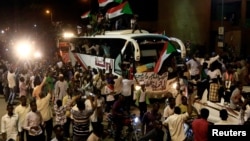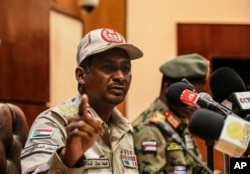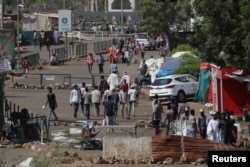Tensions between Sudan’s ruling military council and protesters have spiked after the military warned it could remove barricades near their month-long sit-in. Protesters responded by fortifying obstacles around the protest camp and calling for a mass rally to pressure the military to hand over power to civilians.
Sudan’s main protest group, the Sudanese Professionals Association, has called for a mass rally to begin Thursday at one o'clock in the afternoon, with the aim of fully achieving their demand for civilian rule.
The call came a day after the Transitional Military Council said it wanted to remove protesters’ barricades from bridges and roads and would not allow any more “chaos” in Sudan.
Deputy chief of the TMC Mohamed Hamdan Dagalo said it was their duty to safeguard citizens, property, and the law. He said the barricades are paralyzing business in Khartoum and promoting criminal activity.
We don't accept any chaos and attacking citizens and their property or state properties, said Dagalo. We will handle it with required closure and acting under the law, he said.
Protesters at the main protest camp, outside army headquarters, responded by building some barricades even higher.
Sitting in a chair behind a one-meter-high fence made of stones and iron, protester Mohamed al-Tayeb is defiant.
He said in the sit-in securing committee they have noticed some attempts to clear the demonstration. But this latest threat has been met with more protesters and bigger barricades.
Sudanese have been protesting by the thousands since December for a change in government. They have refused to end their sit-in demonstration even after April 11, when the military ousted President Omar al-Bashir from three decades in power.
On Tuesday evening, the protesters were joined by a large group of supporters from Sudan’s war-torn Darfur region, including Mutasim Ali.
He said people should not trust the military council, and that military leaders should hand over power to civilians as agreed.
Sudan’s protesters have reasons not to trust the military.
It has yet to offer proof that Bashir is behind bars and has refused to turn him over to the International Criminal Court, which wants him for alleged war crimes in Darfur.
The protesters and military last week agreed in principle to a power-sharing joint council but failed to agree on which side would hold a majority of seats.
On Wednesday, the African Union shortened a deadline for Sudan’s military council to hand power to a civilian-led council from three months to two. The AU initially gave the military a two-week deadline to avoid suspension in the bloc, which it later extended.








